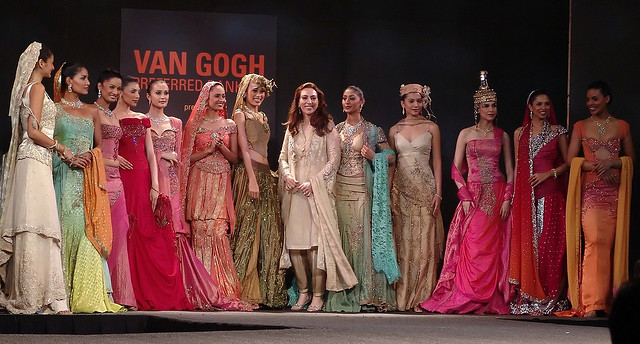In a Pakistani interview long before becoming a household name, Malala shared her dreams of becoming a politician, gave advice on foreign policy (including drones), and thanked the Pakistani Army for their successful operation in Swat. Malala was a force to be reckoned with long before the Taliban shot her in the head. And despite their best efforts to silence her, she is an even greater force to be reckoned with now.
Assed Baig in his article, “Malala and the White Saviour Complex” failed to understand the universality of Malala’s message and didn’t give her the credit she deserves. This is not the story of “the weak native girl being saved by the white man,” it’s the story of the bravest girl in the world. A girl with a voice so powerful she had to be eliminated. The West didn’t offer Malala protection when she was receiving daily death threats nor did a knight in shining armor rescue her when she stood face to face with the Taliban. She endured these threats alone without the tactical support of the world’s largest armies; let alone a bullet proof vest or a bodyguard.
Baig argues that although her message is true and profound it has been “hijacked by the West.” Therefore this coverage must be scorned and vilified. His very masculinity as a brown man and worldview in which the West must remain the enemy are brought into question when Malala receives a warm welcome by the international community. He cannot fathom doctors, activists, institutions, and politicians engaged in humanitarian work unrelated to a larger racist narrative.
More troubling, he can not fathom Malala being a true inspiration to the West. As she spoke from the podium of the United Nations inspiring millions by her words — others such as Baig felt a sense of shame that a native girl stood on a world stage. At the UN Malala demanded the strongest leaders in the world “…to change their strategic policies in favour of peace and prosperity,” as she averred the urgency to protect the rights of women and children. Since being attacked she hasn’t hesitated a single day in speaking out against the Taliban. In meeting with President Obama, Malala reiterated the concerns back home about drone attacks. One wonders if a Muslim man had made such a litany of demands to both world leaders and terrorists alike would Baig have referred to him as a “tool for the West” or celebrated him as a hero?
Remnants of Baig’s distrust eerily reminded me the rambling letter Taliban Commander Adnan Rashid wrote to Malala explaining that every perceived Western good must have within it a sinister plot. He too accused Malala of being easily swayed and “using her tongue at the behest of others” depriving her of her own agency and ideas.
Similarly, Baig’s argument seeks to confine Malala and place restrictions lest she become impure with Western exposure, sympathy, or indoctrination. Baig continues in making even her medical treatment in England a means of shame for the native brown man. Such divisive attitudes seek to perpetuate a cycle of cynicism and distrust. There seems to be no room in such a world view for reconciliation, redemption, or working together with “the white man” for common goals.
Furthermore it is a sexist narrative. Vilifying coverage of Malala’s message is another attempt to silence her. Comparing her to victims of violence who were not specifically targeted for their fierce activism doesn’t make sense, even though their deaths are tragic and wrong. Extremists have intentionally killed far more people in Pakistan than any drone. They have deliberately destroyed countless Pakistani schools and vow to continue doing so. And if we are comparing, how many schools have the Taliban built?
As Malala Yousafzai stood on the world’s stage, she paid homage to her culture, religion, heroes, and dreams. Her eloquent voice aligned with those of countless other girls whom she spoke for. Far from needing a savior she embodied a remarkable image of Muslim female leadership and power — she was the savior. Her message remains that we must join hands with all people from all walks of life who support education, including Gordon Brown. It echoes the highest ideals of her heroes who taught mercy, unity, forgiveness, reconciliation, and also called for non-violence.
Malala’s dreams have not been hijacked, she has been given the largest global platform in order to amplify her voice. Why should that disgust us? Shouldn’t it make us proud? It is not just the West, but also the East which lauded her with praise. By denigrating Malala’s profound message as “western propaganda” Baig is doing far more to try to rob Malala’s dreams before they even come to fruition simply because it’s not the kind of “so-called propaganda” he would like highlighted. Yet the irony of such sensationalism is that had the media largely ignored Malala’s story, Baig would be outraged.
Those who want to paint Malala as an easily influenced “tool” and not as a strong young Muslim woman driving an inspirational campaign have failed to really listen to her message. We face a grave danger to our own advancement as a society if we label brave female activists who use an international platform as ‘tools’ or ‘traitors’ hurling an attack on the native man’s honor. Shouldn’t we instead rally to their causes as their biggest supporters as opposed to being cynical of their fame? Even join in applauding them when the world takes notice of our own heroes? Whose side are we on?
Meriam Sabih has a BA is English and Psychology from Rutgers, The State University of New Jersey. She blogs at http://meriamsabih.wordpress.com. She has also been featured on popular Pakistani blog site http://pakteahouse.net and http://mediadiversityuk.com.
Follow Meriam Sabih on Twitter: https://twitter.com/@meriamsabih.




